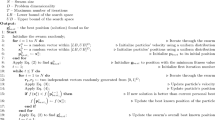Abstract
This paper introduces central force optimization as a new, nature-inspired metaheuristic for multidimensional search and optimization based on the metaphor of gravitational kinematics. CFO is a “gradient-like” deterministic algorithm that explores a decision space by “flying” a group of “probes” whose trajectories are governed by equations analogous to the equations of gravitational motion in the physical universe. This paper suggests the possibility of creating a new “hyperspace directional derivative” using the Unit Step function to create positive-definite “masses” in “CFO space.” A simple CFO implementation is tested against several recognized benchmark functions with excellent results, suggesting that CFO merits further investigation.
Similar content being viewed by others
References
Dorigo, M., Maniezzo, V., Colorni, A.: Positive feedback as a search strategy. Dipartimento di Elettronica, Politecnico di Milano, Italy, Tech. Rep. http://iridia.ulb.ac.be/~mdorigo/pub_x_subj.html 91-016 (1991)
Kennedy, J., Eberhart, R.: Particle swarm optimization. Proc. IEEE Conf. on Neural Networks, 4 (Nov/Dec), 1942–1948 (1995)
Formato, R.A., Copyright Reg. nos. TX 6459271, 6461552, 6468062, 6464965, 6522082, 6540042, 6603758, 6823122, November (2006) et seq., US Library of Congress, Washington, DC, http://www.copyright.gov.
Formato, R.A.: Central force optimization: A new metaheuristic with applications in applied electromagnetics. Progress in electromagnetics research. PIER 77, 425–491. http://ceta.mit.edu/PIER/pier.php?volume=77 (2007).
Formato, R.A.: Central force optimization: A new computational framework for multidimensional search and optimization. In: Krasnogor, N., Nicosia, G., Pavone, M. Pelta, D. (eds.) Studies in Computational Intelligence (SCI), vol. 129, pp. 221–238, Springer-Verlag, Heidelberg (2008)
Formato, R.A.: Central force optimisation: a new gradient-like metaheuristic for multidimensional search and optimization. Int. J. Bio-Inspired Computation, 1, 217–238 (2009)
Yao, X., Liu, Y., Lin, G.: Evolutionary programming made faster. IEEE Trans. Evol. Comp. 3(2), 82–102 (1999)
Cui, Z., Zeng, J., Sun, G.: A fast particle swarm optimization Int. J. Innovative Computing, Information Control. 2(6), 1365–1380 (2006)
Schweickart, R., Chapman, C., Durda, D., Hut, P., Bottke, B., Nesvorny, D.: Threat characterization: trajectory dynamics (White Paper 039). arXiv:physics/0608155v1. http://arxiv.org/abs/physics/0608155 (2006).
Valsecchi, G.B., Milani, A., Gronchi, G.F., Chesley, S.R.: Resonant returns to close approaches: analytical theory. Astronomy Astrophysics, 408(3), 1179–1196 DOI: 10.1051/0004-6361:20031039 (2003).
Battiti, R., Brunato, M.: Reactive search: machine learning for memory-based heuristics. In: Gonzalez, T.F. (ed.), Approximation algorithms and Metaheuristics, Taylor & Francis Books (CRC Press), Washington, DC, (2007)
Author information
Authors and Affiliations
Corresponding author
Rights and permissions
About this article
Cite this article
Formato, R.A. Central force optimization: A new deterministic gradient-like optimization metaheuristic. OPSEARCH 46, 25–51 (2009). https://doi.org/10.1007/s12597-009-0003-4
Accepted:
Published:
Issue Date:
DOI: https://doi.org/10.1007/s12597-009-0003-4




